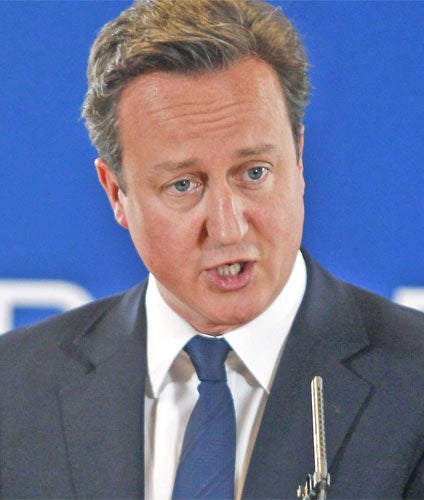Andrew Grice: Greece aside, Cameron knows a strong euro is good for the UK
Inside Westminster

"Towards a stronger European economic governance" says the giant poster on the side of the European Commission's Berlaymont headquarters in Brussels.
Incredibly, it has a picture of a euro coin on it.
It is staring down at me as I write this, at the end of a two-day summit of EU leaders, and I can't help wondering how quickly such a poster would be ripped down or defaced if it were put up in Athens. The romantics who dream of ever-closer European integration never give up but seem dangerously out of touch with the ordinary people they seek to represent.
The tensions always inherent in the one-size-fits-all single currency have finally boiled over into the Greek crisis. In their heads, the Brussels brigade know the economic signs point overwhelmingly towards Greece defaulting on its loans and leaving the euro. But their hearts tell them to apply yet more sticking-plaster because seeing one member leave the euro would be a devastating setback to the entire EU project. Remarkably, ardent pro-Europeans think the solution to this Greek tragedy is another integrationist leap forward, for example, the creation of an EU finance minister.
It won't happen. Angela Merkel and Nicolas Sarkozy won't allow it. The heyday of an all-powerful European Commission has passed; the German Chancellor and French President sideline it when they can. They are the engine-drivers now. The nation states, not the EU bureaucracy, call the shots.
That doesn't mean, as some suggest, that the euro will implode if – or more likely, when – Greece leaves it. Germany and France have invested too much in such an integral part of the EU project. In my experience, politics often trumps economics and so reports of the euro's imminent death are exaggerated.
In Britain, Conservative and Labour Eurosceptics dance prematurely on its grave. They wish for something that could create turmoil across Europe and stall the already fragile growth in their own country.
David Cameron is sensible enough to realise that a strong euro is good for Britain. Although a pragmatist in his head, he is a Eurosceptic at heart. As a 25-year-old political adviser, he was scarred by Britain's humiliating expulsion from the European exchange rate mechanism in 1992, which eventually cost his boss, the Chancellor Norman Lamont, his job. But Mr Cameron drew an important conclusion from William Hague's "Save the pound" 2001 election campaign as Tory leader: the British public cared more about public services than the EU.
So as Tory leader he declared that his party should stop "banging on about Europe". When he became Prime Minister, Brussels feared the arrival of a Thatcher Mark 2. They were pleasantly surprised to find a supreme pragmatist keen to forge close relations with Ms Merkel and Mr Sarkozy. "I am a practical, positive person and I come to these meetings with a practical, positive agenda," Mr Cameron told journalists yesterday.
But what does he make of the EU? He doesn't think summits are the most productive use of his time. So he networks and build alliances for future battles. A big one looms over the EU's budget for 2014-20, where he will lead demands for a freeze.
And yet again, Mr Cameron is using the Tony Blair Playbook. Mr Blair vowed to end the UK's half-in, half-out approach to Europe by taking it into the single currency. Gordon Brown stopped him. Although it is unfashionable to praise Mr Brown, current events show how right he was.
Mr Cameron has been lucky. The British people can enjoy the best of both worlds, the benefits of the single market without the instability of the single currency. Probably the kind of Europe most of us would want.
The arch-federalists have always hated the idea of such a two-speed or multi-speed Europe but it is unfolding before our eyes. The EU train's direction of travel is now unmistakable and Greece won't be the last stop.
Join our commenting forum
Join thought-provoking conversations, follow other Independent readers and see their replies
0Comments